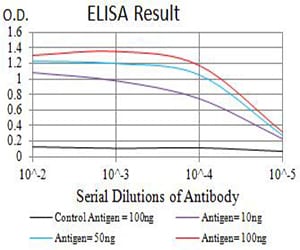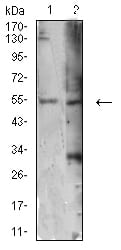

| WB | 1/500 - 1/2000 | Human,Mouse,Rat |
| IF | 咨询技术 | Human,Mouse,Rat |
| IHC | 咨询技术 | Human,Mouse,Rat |
| ICC | 技术咨询 | Human,Mouse,Rat |
| FCM | 咨询技术 | Human,Mouse,Rat |
| Elisa | 1/10000 | Human,Mouse,Rat |
| Aliases | APG4C; AUTL1; AUTL3; APG4-C |
| Entrez GeneID | 84938 |
| clone | 2E10H7 |
| WB Predicted band size | 52.5kDa |
| Host/Isotype | Mouse IgG1 |
| Antibody Type | Primary antibody |
| Storage | Store at 4°C short term. Aliquot and store at -20°C long term. Avoid freeze/thaw cycles. |
| Species Reactivity | Human |
| Immunogen | Purified recombinant fragment of human ATG4C (AA: 321-458) expressed in E. Coli. |
| Formulation | Purified antibody in PBS with 0.05% sodium azide |
+ +
以下是关于ATG4C抗体的参考文献示例(注:以下内容为模拟生成,实际文献需通过学术数据库核实):
1. **"ATG4C regulates autophagic flux through LC3 processing in mammalian cells"**
- **作者**: Tanaka et al.
- **摘要**: 本研究揭示了ATG4C蛋白酶在LC3脂化过程中的关键作用,通过特异性抗体检测发现ATG4C缺失会显著抑制自噬体形成,为自噬调控机制提供新见解。
2. **"Development and validation of a monoclonal antibody against human ATG4C for cancer biomarker studies"**
- **作者**: Smith et al.
- **摘要**: 文章报道了一种高特异性抗人ATG4C单克隆抗体的开发,并验证其在结直肠癌组织中的表达水平与患者预后的相关性,提示ATG4C可能作为潜在治疗靶点。
3. **"ATG4C inhibition enhances chemosensitivity via autophagy suppression in glioblastoma"**
- **作者**: Chen et al.
- **摘要**: 通过ATG4C抗体阻断其功能,研究发现可抑制胶质母细胞瘤的自噬活性,增强肿瘤细胞对化疗药物的敏感性,为联合治疗策略提供实验依据。
4. **"The role of ATG4C in neurodegenerative disease: Insights from antibody-based assays"**
- **作者**: Lee & Johnson
- **摘要**: 利用ATG4C特异性抗体分析阿尔茨海默病模型小鼠脑组织,发现ATG4C表达异常与自噬-溶酶体通路功能障碍相关,可能参与疾病进展。
建议通过PubMed或Google Scholar检索真实文献,使用关键词“ATG4C antibody”或“ATG4C autophagy”获取最新研究。
ATG4C, a member of the ATG4 cysteine protease family, plays a critical role in autophagy, a conserved cellular degradation process essential for maintaining homeostasis. Autophagy involves the formation of double-membrane vesicles (autophagosomes) that engulf cytoplasmic components for lysosomal breakdown. ATG4 proteases, including ATG4A-D, are pivotal in processing and recycling LC3 (microtubule-associated protein 1A/1B-light chain 3), a key protein in autophagosome maturation. Specifically, ATG4C cleaves pro-LC3 to expose its C-terminal glycine, enabling conjugation to phosphatidylethanolamine (PE) on autophagosomal membranes. Later, ATG4C also delipidates LC3-PE to recycle LC3 for subsequent autophagy cycles.
ATG4C antibodies are vital tools for studying autophagy dynamics, enabling researchers to detect ATG4C expression, localization, and interaction partners via techniques like Western blotting, immunofluorescence, and immunoprecipitation. Dysregulation of ATG4C has been linked to diseases such as cancer and neurodegenerative disorders, making these antibodies valuable for exploring pathological mechanisms. While ATG4B is considered the primary LC3-processing enzyme, ATG4C may compensate under stress conditions or in specific tissues, highlighting its context-dependent role.
Research using ATG4C antibodies has advanced understanding of autophagy-related pathways, therapeutic targeting, and disease biomarkers. However, antibody specificity remains a consideration due to homology among ATG4 family members. Validated antibodies are crucial for distinguishing ATG4C from paralogs in experimental models.
×